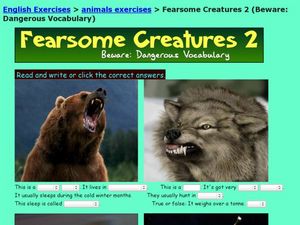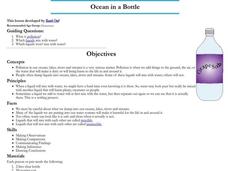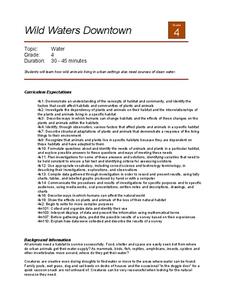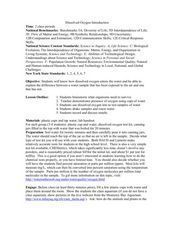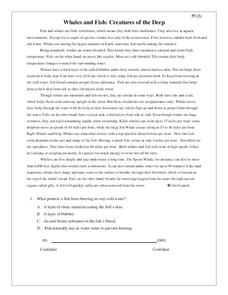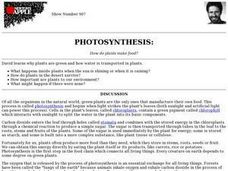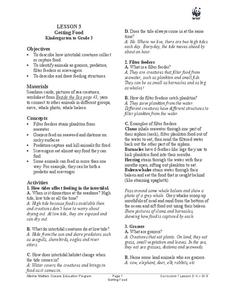Alabama Learning Exchange
Make a Difference!
We are very dependent upon other life forms around us to survive. Here, scholars explore relationships in the ecosystem with the help of Auntie Litter and the pollution patrol. They imagine a world without grass, making connections to...
Curated OER
Fearsome Creatures 2
In this fearsome creatures worksheet, students choose the correct words to fill in the blanks to sentences about dangerous animals. Students complete this for 10 animals.
Curated OER
Ocean in a Bottle
Students investigate pollution in water. In this pollution lesson plan, students participate in an experiment to simulate water pollution. Students observe how the water reacts to the "pollution."
Wilderness Classroom
Pollution
Educate scholars on pollution—air, water, and land—with a series of lessons that begin with a thorough explanation of each type. Learners then take part in three activities to reinforce the importance of reducing pollution. They...
Curated OER
Salt Water Revival
Learners produce a high tide. In this Marine Biology lesson, students visit a tide pool to investigate the creatures response to changes in the tide. Learners discuss the results of their experimentation.
Curated OER
Water Quality Monitoring
Learners comprehend the four parameters of water quality. They perform tests for salinity, dissolved oxygen, pH and clarity or turbidity. Students comprehend why scientists and environmental managers monitor water uality and aquatic...
Curated OER
Water Quality
Students are presented with a hypothetical situation to investigate the water quality of the James River. They are given data to analyze and put into the graphic organizer that is included to help solve the problem. The lesson includes...
Curated OER
Investigating Animals in Water
Students observe small animal activity. They identify local water animals and describe the habitats where water animals can be found. Students collect samples to observe in the classroom.
Curated OER
Wild Waters Downtown
Fourth graders investigate how wild animals living in urba settings also need sources of clean water. They discuss the open water issues of West Nile Virus and what happens to urba animals as these poolings area are cleaned up. ...
NOAA
What Killed the Seeds?
Can a coral cure cancer? Take seventh and eighth grade science sleuths to the underwater drugstore for an investigation into emerging pharmaceutical research. The fifth installment in a series of six has classmates research the wealth of...
Curated OER
Fish Banners
An art instructional activity involving fish can accent a wide variety of subjects. Here are the steps needed to create a fish banner with paint, shapes, cardboard, and paper. This would be a nice way to start or finish a unit on fish or...
Curated OER
October:Holy Gargoyles!
Learners experience and participate in making mythic creatures during a study in architecture history and spooky sculpture for Halloween. They interact with the subject of gargoyles and the creation of their own gargoyles, ghosts and...
Curated OER
Dissolved Oxygen Introduction
Students are shown how dissolved oxygen enters the water. They are taught the difference between a water sample that has been exposed to the air and one that has not. Students brainstorm what organisms need to survive. They use dissolved...
DK Publishing
Big, Bigger, Biggest
Which water creature is the biggest? Youngsters look at an image of a big shell, then draw a bigger shell next to it. They do the same for a big fish. Next, learners practice with the superlative as they circle the biggest duck and frog....
Curated OER
Pond 2: Life in a Drop of Pond Water
Students observe organisms found in pond water with a microscope. In groups, they discuss how single-celled organisms satisfy their needs for food, water and air. They compare and contrast the needs of macroscopic and microscopic...
Curated OER
Runoff: Intro to Watersheds
High schoolers are taught that a watershed is, what types of basic land cover are impermeable and permeable to water. They trace the flow of water around their school and around their home. Students determine what watershed their school...
Curated OER
How Much Water is in That River?
Students practice measurement using the Hudson River. They calculate the discharge measurement at a location on the Hudson River using ingenuity and a topographic map.
Curated OER
Whales and Fish: Creatures of the Deep
Practice comparing and contrasting details in informational text with a reading passage about whales. It explains the ways that fish and whales are similar, as well as the ways they are different, and specific characteristics of various...
NOAA
Deep-Sea Corals
Come take a peak at the corals in the deep. Science scholars discover the hidden world of deep-sea corals in the third installment of a 13-part series. Topics include the differences between shallow water and deep-sea corals, the slow...
Curated OER
Photosynthesis: How do plants make food?
Students study why plants are green and how water is transported in them. They examine how plants respond to different amounts of light.
Curated OER
Tides and How Creatures Survive
Students discover tidal pools. In this oceanographic lesson, students observe the tides of the earth and the creatures that inhabit the intertidal zones. Students role-play the tidal zones by portraying themselves as animals of the...
Curated OER
What Lives in Water: Pre and Post Activities
In this multiple choice worksheet, learners answer questions about fish and how fish live. After visiting the aquarium, students chart the different creatures they see during their visit and solve mathematical equations of their findings.
Curated OER
Oddball Out: Pond Creatures
In this problem solving worksheet, students analyze a row of pictures of various pond creatures to determine which creature is different from the others pictured.
Curated OER
Getting Food
Students complete activities to learn about the ocean food web. In this ocean life instructional activity, students discuss how the tides affect feeding, learn about filter feeders, grazers, predators, and scavengers. Students then group...



